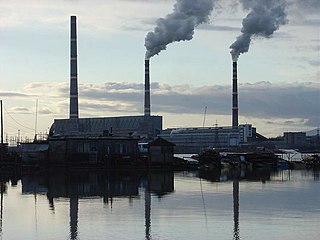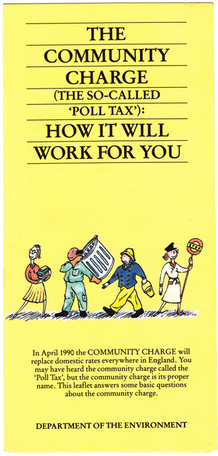
Emissions trading is a market-based approach to controlling pollution by providing economic incentives for reducing the emissions of pollutants. The concept is also known as cap and trade (CAT) or emissions trading scheme (ETS). One prominent example is carbon emission trading for CO2 and other greenhouse gases which is a tool for climate change mitigation. Other schemes include sulfur dioxide and other pollutants.

A carbon tax is a tax levied on the carbon emissions required to produce goods and services. Carbon taxes are intended to make visible the "hidden" social costs of carbon emissions, which are otherwise felt only in indirect ways like more severe weather events. In this way, they are designed to reduce greenhouse gas emissions by increasing prices of the fossil fuels that emit them when burned. This both decreases demand for goods and services that produce high emissions and incentivizes making them less carbon-intensive. When a hydrocarbon fuel such as coal, petroleum, or natural gas is burned, most or all of its carbon is converted to CO2. Greenhouse gas emissions cause climate change, which damages the environment and human health. This negative externality can be reduced by taxing carbon content at any point in the product cycle. Carbon taxes are thus a type of Pigovian tax.

The Phrygian cap or liberty cap is a soft conical cap with the apex bent over, associated in antiquity with several peoples in Eastern Europe and Anatolia, including the Persians, the Medes and the Scythians, as well as in the Balkans, Dacia, Thrace and in Phrygia, where the name originated. The oldest depiction of the Phrygian cap is from Persepolis in Iran.
In professional sports, a salary cap is an agreement or rule that places a limit on the amount of money that a team can spend on players' salaries. It exists as a per-player limit or a total limit for the team's roster, or both. Several sports leagues have implemented salary caps, using them to keep overall costs down, and also to maintain a competitive balance by restricting richer clubs from entrenching dominance by signing many more top players than their rivals. Salary caps can be a major issue in negotiations between league management and players' unions because they limit players' and teams' ability to negotiate higher salaries even if a team is operating at significant profits, and have been the focal point of several strikes by players and lockouts by owners and administrators.

The Community Charge, commonly known as the poll tax, was a system of taxation introduced by Margaret Thatcher's government in replacement of domestic rates in Scotland from 1989, prior to its introduction in England and Wales from 1990. It provided for a single flat-rate, per-capita tax on every adult, at a rate set by the local authority. The charge was replaced by Council Tax in 1993, two years after its abolition was announced.
A luxury tax in professional sports is a surcharge put on the aggregate payroll of a team to the extent to which it exceeds a predetermined guideline level set by the league. The ostensible purpose of this "tax" is to prevent teams in major markets with high incomes from signing almost all of the more talented players and hence destroying the competitive balance necessary for a sport to maintain fan interest. The money derived from the "tax" is either divided among the teams that play in the smaller markets, presumably to allow them to have more revenue to devote toward the contracts of high-quality players, or in the case of Major League Baseball, used by the league for other pre-defined purposes.
Superannuation in Australia or "super" is a savings system for workplace pensions in retirement. It involves money earned by an employee being placed into an investment fund to be made legally available to fund members upon retirement. Employers make compulsory payments to these funds at a proportion of their employee's wages. From July 2023, the mandatory minimum "guarantee" contribution is 11%, rising to 12% from 2025. The superannuation guarantee was introduced by the Hawke government to promote self-funded retirement savings, reducing reliance on a publicly funded pension system. Legislation to support the introduction of the superannuation guarantee was passed by the Keating Government in 1992.
The NBA salary cap is the limit to the total amount of money that National Basketball Association teams are allowed to pay their players. Like the other major professional sports leagues in North America, the NBA has a salary cap to control costs and benefit parity, defined by the league's collective bargaining agreement (CBA). This limit is subject to a complex system of rules and exceptions and is calculated as a percentage of the league's revenue from the previous season. Under the CBA ratified in July 2017, the cap will continue to vary in future seasons based on league revenues. For the 2022–23 season, the cap is set at $123.655 million.
The Inland Revenue Department (IRD) is the Hong Kong government department responsible for collecting taxes and duties.
In Hong Kong, profits tax is an income tax chargeable to business carried on in Hong Kong. Applying the territorial taxation concept, only profits sourced in Hong Kong are taxable in general. Capital gains are not taxable in Hong Kong, although it is always arguable whether an income is capital in nature.
Under Article 108 of the Basic Law of Hong Kong, the taxation system in Hong Kong is independent of, and different from, the taxation system in mainland China. In addition, under Article 106 of the Hong Kong Basic Law, Hong Kong has independent public finance, and no tax revenue is handed over to the Central Government in China. The taxation system in Hong Kong is generally considered to be one of the simplest, most transparent and straightforward systems in the world. Taxes are collected through the Inland Revenue Department (IRD).

Carbon pricing is a method for nations to address climate change. The cost is applied to greenhouse gas emissions in order to encourage polluters to reduce the combustion of coal, oil and gas – the main driver of climate change. The method is widely agreed and considered to be efficient. Carbon pricing seeks to address the economic problem that emissions of CO2 and other greenhouse gases (GHG) are a negative externality – a detrimental product that is not charged for by any market.
Taxation in the British Virgin Islands is relatively simple by comparative standards; photocopies of all of the tax laws of the British Virgin Islands (BVI) would together amount to about 200 pages of paper.

La Poterie-Cap-d’Antifer is a commune in the Seine-Maritime department in the Normandy region in northern France.

Taxes in Indiana are almost entirely authorized at the state level, although the revenue is used to fund both local and state level government. The state of Indiana's income comes from four primary tax areas. Most state level income is from a sales tax of 7% and a flat state income tax of 3.23%. The state also collects an additional income tax for the 92 counties. Local governments are funded by a property tax that is the sum of rates set by local boards, but the total rate must be approved by the Indiana General Assembly before it can be imposed. Residential property tax rates are capped at maximum of 1% of property value. Excise tax is the fourth form of taxation and is charged on motor vehicles, alcohol, tobacco, gasoline, and certain other forms of movable property; most of the proceeds are used to fund state and local roads and health programs. The Indiana Department of Revenue collects all taxes and pays them out to the appropriate agencies and municipalities. The Indiana Tax Court deals with all tax disputes issues, but decisions can be appealed to the Indiana Supreme Court.

The Office for Budget Responsibility (OBR) is a non-departmental public body funded by the UK Treasury, that the UK government established to provide independent economic forecasts and independent analysis of the public finances. It was formally created in May 2010 following the general election and was placed on a statutory footing by the Budget Responsibility and National Audit Act 2011. It is one of a growing number of official independent fiscal watchdogs around the world.
The Massachusetts Automatic Gas Tax Increase Repeal Initiative, Question 1 was on the November 4, 2014 statewide ballot. Approved by voters, the measure repeals a 2013 law that would automatically adjust gas taxes according to inflation, allowing for automatic annual increases in the state's gas tax.
The United States federal state and local tax (SALT) deduction is an itemized deduction that allows taxpayers to deduct certain taxes paid to state and local governments from their adjusted gross income.
As part of the sanctions imposed on the Russian Federation as a result of the Russo-Ukrainian War, on September 2, 2022, finance ministers of the G7 group of nations agreed to cap the price of Russian oil and petroleum products in an effort intended to reduce Russia's ability to finance its war on Ukraine while at the same time hoping to curb further increases to the 2021–2023 inflation surge.
As part of the sanctions imposed on the Russian Federation as a result of the Russo-Ukrainian War, on 3 December 2022, the European Union (EU) agreed to cap the price of natural gas in order to reduce the volatility created by Russia in the gas market.







